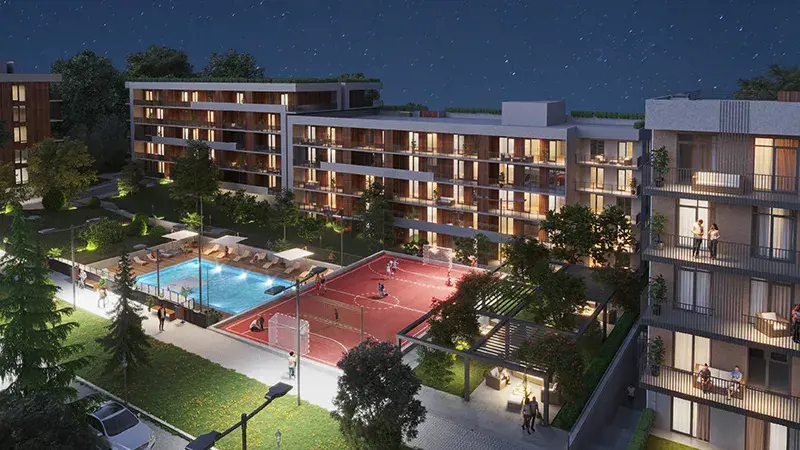FAQ: Everything About Buying and Selling Property in Georgia
#Other
Thinking about entering Georgia's real estate scene? You’re certainly not the only one. The country has caught plenty of international investors' (and home-seekers) eyes, thanks to its positive policies, a rapidly growing property market, and (this is important), the lack of red tape for foreigners.
Still, navigating any real estate deal, especially abroad, can feel daunting. That's why we've put together this FAQ – to simplify things and offer straightforward answers about buying and selling property in Georgia. Doesn’t matter if you're thinking of an apartment in a lively district close to the city center like Saburtalo or a quieter place in a more peripheral spot like Gldani, or maybe even a coastal property in Batumi – understanding the local ins and outs should be your first step.
Can foreigners buy property in Tbilisi, Georgia?
Good news: Georgia's legal framework is remarkably open to foreigners buying property. Generally, very few hurdles stop non-Georgian citizens from purchasing homes or commercial spaces. In most cases, non-residents have pretty much the same rights as citizens in acquiring real estate. The easy stance is a big reason many international buyers are keen to buy property in Tbilisi (and Georgia, overall). Making the process smoother than in many other countries goes a long way toward attracting investors. Who knew!
What types of property can foreigners legally purchase in Georgia?
We did mention that non-residents have the same rights in most cases. Now let’s parse what cases make the exceptions.
So, what can you buy? Foreigners generally have the green light for a wide variety of properties: apartments (perhaps we can convince you to consider a modern unit in one of Archi's Isani or Saburtalo projects?), houses, and commercial property like offices or shops.
The one big exception is agricultural land. Georgian law mostly reserves farmland ownership for its citizens or majority-Georgian companies. However, foreigners can lease agricultural land for long periods, often up to 49 years. Also, be aware of recent changes: as of April 2024, new rules might add extra layers for owning certain land types (agricultural and near military sites) if you're from a country on a specific U.S. "foreign adversaries" list. If this could affect you, it’s wise to invest in Tbilisi real estate that has already been developed, rather than seek out undeveloped areas.
What is the average price of an apartment in Tbilisi?
An "average" apartment price is always tricky when it comes to large European cities. Tbilisi is no exception, as the prices can swing wildly depending on multiple factors. Location, of course, is a major one - city center and nearby districts like Saburtalo will almost always cost more than a quieter area like Isani or Vashlijvari. Newer projects cost more than the old ones. Size, condition, and even layout will also impact price per square meter.
We can, however, try to give you a ballpark. When scanning property for sale in Georgia (Europe), newer constructions will start around $600 USD per square meter and go up to $1500 the closer you get to the center, closer the project is to being finished, and the final condition you’ll receive the apartment in (black vs. white vs. green carcass).
You can often find comparatively cheap property in Tbilisi the further away from the city center you go and the earlier in the development phase you purchase. Or, if your budget is constraint, consider investing someplace else. Tbilisi is certainly one of the best Georgian cities to invest in, but it certainly isn’t the only one.

Is it generally cheaper to buy or rent in Georgia?
The buy-versus-rent question in Georgia isn't a one-size-fits-all answer. It really depends on your finances, long-term plans, and intended length of stay. Renting a one-bedroom in a decent Tbilisi area typically costs $400-$600 USD monthly, with variations. Buying a Tbilisi property means a large upfront investment. Owners also face ongoing property taxes (comparatively low, but still) and upkeep. You'll need to crunch the numbers for your situation to see which path is more cost-effective.
What is the typical step-by-step process for a foreigner to buy property in Georgia?
Still seriously planning to buy property in Tbilisi? Luckily the process for foreigners is pretty clear and efficient, with a streamlined system a real perk when looking into Georgia real estate. Here’s a condensed overview:
- Property Search: Find your ideal apartment (perhaps a new Archi unit in Saburtalo or Isani?).
- Background Check (Crucial!): Verify legal status, ownership, and check for encumbrances (liens, mortgages) with the National Agency of Public Registry (NAPR). Getting legal help is highly recommended here.
- Preliminary Agreement (Optional): Often outlines basic terms and involves a deposit (commonly ~10%).
- Final Sales Agreement: The legally binding document, signed in Georgia, usually in Georgian. Ensure an accurate translation, as the Georgian version prevails.
- Property Registration (NAPR): Officially transfers ownership; often done in one business day.
- Payment: Finalize the transaction, typically via bank transfer.
What are the common costs and taxes associated with buying property in Georgia?
When purchasing property in Georgia (Tbilisi, Batumi, or anywhere else) make sure to anticipate costs beyond the main price:
- Purchase Price: The agreed amount.
- Registration Fees (NAPR): Low, 50-200 GEL for property transfer.
- Notary Fees (Optional): 100-200 GEL for document authentication/translation.
- Real Estate Agent Commission: Typically 1-3% of property value (negotiable).
- Legal Fees: Variable, for due diligence and contract review.
- Annual Property Tax: Low, 0.05% to 1% of market value.
- No Stamp Duty/Purchase Tax (Usually): A big plus – Georgia generally doesn’t levy these.

Can foreigners obtain a mortgage in Georgia, and what are the typical requirements?
Yes, foreigners can get mortgages from most Georgian banks (e.g., Bank of Georgia, TBC). However, conditions for non-residents may be slightly different. Some banks can be less trusting of non-residents, so you should anticipate a higher down payment (often around 40%), possibly shorter repayment terms (commonly max 10 years), and potentially less favorable interest rates. It’s not what always happens, but if you’re seriously looking at apartments in Tbilisi, you should plan your investment with these possibilities in mind.
Does buying property in Georgia qualify a foreigner for residency, and what are the investment thresholds?
Real estate doesn’t automatically qualify a foreigner for it, but it’s much easier to buy property in Georgia and get residency than to do so without.
Purchasing property valued at $100,000+ USD (as verified by an appraiser) can make a foreigner eligible for a temporary residence permit, usually for one year and renewable. An investment of $300,000+ USD in non-agricultural property might allow application for permanent residency after six years of physical presence. Investment thresholds and rules can change, so do keep up with regulations.
What are the tax implications for foreigners when selling property in Georgia?
If you sell your Georgian property, what taxes apply to you as a foreigner? Mainly withholding tax and capital gains tax. Here's a brief breakdown:
- Withholding Tax (non-residents):
- Usually 3% of the total sale price.
- Or, 3% of your actual profit (gain), if you give the buyer Form IT-AFF2.
- Capital Gains Tax (residential property):
- 5% of profit if sold within two years of purchase.
- 0% (exempt) if owned for more than two years before selling.
This two-year exemption is a big benefit for longer-term investors. It allows for making big investments that typically require putting in a lot of money upfront, like commercial spaces in Tbilisi or seaside apartments in Batumi, as making a loss on them seems impossible as long as the timeline is long enough.

What is the general process for a foreigner to sell their property in Georgia?
Selling your Georgian property as a foreigner involves finding a buyer (directly, online, or via an agent that will spread the word that you have property for sale in Tbilisi, Georgia), negotiating terms, and signing a sales agreement (ensure an accurate translation if needed, as the Georgian version is legally paramount).
Ownership transfer is finalized at NAPR. Crucially, non-resident sellers must comply with withholding tax rules – usually, the buyer withholds the tax for remittance.
Are there specific legal requirements for foreigners selling property?
Yes. The main subject for non-resident foreigners selling is often the withholding tax (typically 3% of sale price, or 3% of gain with the correct affidavit). Ensuring the sales agreement is accurate and legally sound, with reliable translations if necessary, is vital.
How can a foreigner repatriate funds from the sale of a property in Georgia?
Georgia has a liberal approach to capital movement. Foreigners can generally repatriate funds from property sales without restriction, in any currency (after converting from GEL at market rates). This ease of fund movement is often a key advantage that pushes investors to check out the best place to buy property in Tbilisi, even if they had doubts about committing - if Georgia’s real estate market doesn’t turn out to be to their taste, they can easily sell their property off (at profit!) and take funds back home.
Are there any recent legislative changes foreigners should be aware of regarding property in Georgia?
The most recent changes in legislature was made in April 2024, when law (S.B. 420) restricted "nonresident aliens" from specific countries (those on a U.S. list of foreign adversaries) from owning land near military bases, requiring a buyer's affidavit. Before that, a 2017 amendment restricted foreigners from buying agricultural land. As you can see, changes aren’t made frequently, but they are made, so you must keep up to date if you intend to own a real estate property in Georgia.







